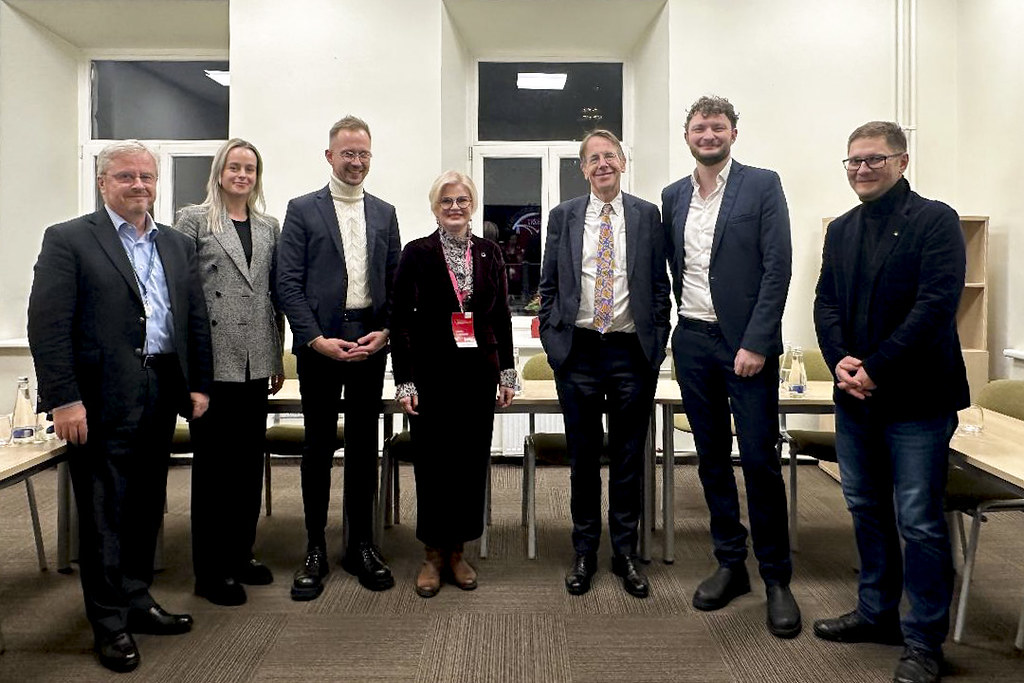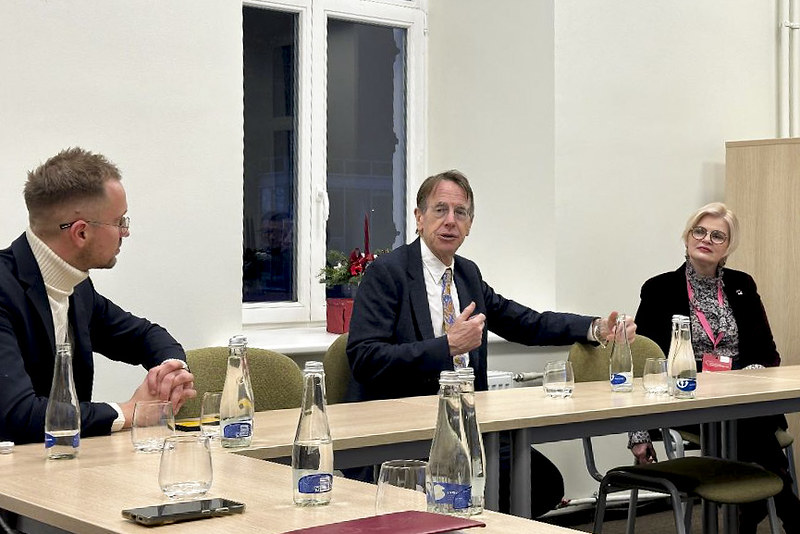 Prof. Arvydas Laurinavičius, Erika Antanėlė, Assoc. Prof. Karolis Ažukaitis, Prof. Jelena Čelutkienė, Prof. Rory Collins, Daniel Naumovas, Mindaugas Morkūnas / © MF archive
Prof. Arvydas Laurinavičius, Erika Antanėlė, Assoc. Prof. Karolis Ažukaitis, Prof. Jelena Čelutkienė, Prof. Rory Collins, Daniel Naumovas, Mindaugas Morkūnas / © MF archive
On December 1 of this year, at the invitation of Prof. Jelena Čelutkienė of the Faculty of Medicine (FM) of Vilnius University (VU), Sir Rory Collins, the director of the UK Biobank and a professor at the University of Oxford, visited. The professor met with the Vice-Dean of Science and Innovation of the Faculty of Medicine, Assoc. Prof. Karolis Ažukaitis, the representative of the Biobank of Vilnius University Hospital Santaros Klinikos, Daniel Naumovas, and other representatives of the faculty and clinics to discuss possibilities for collaboration.
The guest was thoroughly acquainted with the emerging national biobank management system in Lithuania. "We particularly understood the importance of the biobank during the Covid-19 period when it became clear how strongly collected samples can contribute to clinical research," said D. Naumovas. According to him, the currently stored samples were collected from sick individuals, but there are plans for a population and rare disease biobank.
 Assoc.prof. Karolis Ažukaitis, prof. Rory Collins, prof. Jelena Čelutkienė / © MF archive
Assoc.prof. Karolis Ažukaitis, prof. Rory Collins, prof. Jelena Čelutkienė / © MF archive
The unique biomedical database of the UK Biobank, according to Prof. Rory Collins, is the largest, most comprehensive, and widely accessible database of its kind, allowing scientists to conduct various studies. "The personalized data of the UK Biobank are used by researchers from various academic, charity, government, and commercial organizations conducting health-related studies. Lithuanian scientists do not use our data, so I came myself to verify why this is the case," said the professor in good spirits.
According to Assoc. Prof. Karolis Ažukaitis, data protection is a very important issue in Lithuania, so it is relevant to have a platform for the secure use of high-quality data. There is often a need not only to obtain certain data but also to access them in different locations or compare them at the international level. It is clear that data repositories, in this case, are not only a convenient but also a relatively inexpensive storage solution. "Why Lithuanian scientists do not use the services of the UK Biobank, I think the answer is simple: they are simply not informed about such an opportunity. The situation should change after this meeting," said the Vice-Dean of Science and Innovation.
Since 2006, the UK Biobank has been a large-scale biomedical database and a source of scientific research, storing detailed, non-identified genetic and health information obtained from half a million residents of the United Kingdom aged 40-69. The UK Biobank regularly provides blood, urine, and saliva samples, as well as comprehensive lifestyle information. To better understand how individuals experience diseases, this information is later linked to health records. The database of the UK Biobank is regularly supplemented with data that researchers and scientists from around the world can use.
In the near future, researchers from the Faculty of Medicine plan to provide more detailed information about the opportunities for members of their community to use the resources of the UK Biobank. More information about the UK Biobank can be found at: https://www.ukbiobank.ac.uk/.
